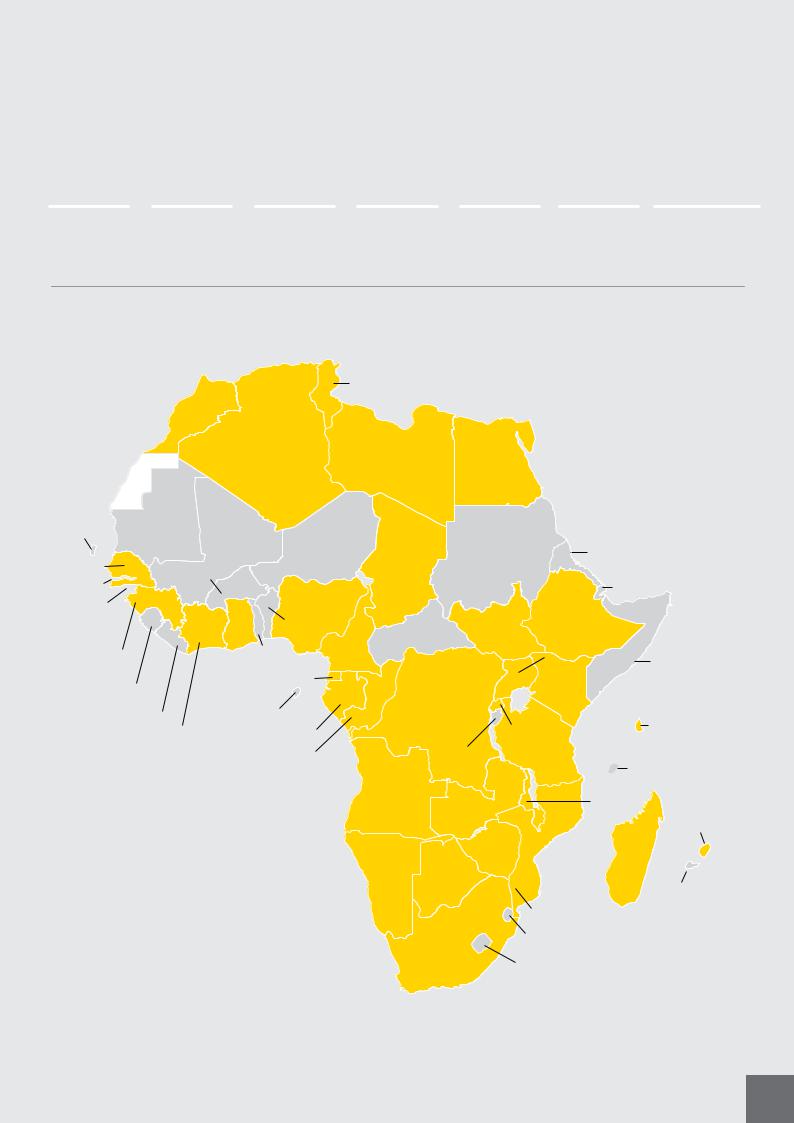
130130 SGF Thought Leadership email version
.pdf
5. People
Strategies are not self-executing. Boardroom-level strategy-making can map out the most exciting opportunity matrices and solid riskmitigation measures across the continent — but their actualization inevitably turns on staff in the countries of operation. Firms that are serious about seeing through their African investment in the longer term have found — and will continue to find — that genuinely investing in people can bring significant rewards. In addition, in many settings, firms encounter large labor surpluses co-existing with shortages of skills.
In the future, success in many sectors and settings will tend to turn on the ability to put human resource development, especially for middle and lower management or team leaders, at the heart of strategy execution. Sustained achievement will depend to a very large extent on finding, training, retaining and supporting good people, in particular, local staff. Relationship networks around staff and their families, as well as host communities, have particular salience in many African contexts.
Specifically, a people-centered approach will mitigate risk in three key areas:
•Social license to operate. Approaches that seek to foster a wider sense of community and derivative enterprise around the firm can give the firm a social license, helping to mitigate disruption and reduce reputational risk. The risk is that executives may underestimate the degree to which members of these networks do not necessarily see clear distinctions between categories of people associated with or impacted by a firm’s operations.
•Relevance to the African consumer. There is continuing (and growing) focus on the African consumer at all levels, especially the scope for further innovation of high-volume, low-value transactions.
In a climate of increasing competition from local and foreign providers and manufacturers, a people-centered approach will add value to consumers. This is particularly true, given the potential for adverse reactions to imported goods or services associated with certain foreign policy considerations.
•Brand management. A people-centered approach will help companies to project their brand as being in touch with its environment. Firms will find many opportunities to strengthen their businesses and brands, while also empowering female participation in the workforce.
Misunderstanding the nature of the challenges in this area carries with it several hazards. In particular, one risk is the temptation to adopt proactive top-down approaches that prevent the reception and application of bottom-up impulses. Africa’s emerging consumer base may not necessarily have a well-developed sense of what specific goods and services appeal to it. However, the continent’s millions
of potential buyers and users are the ones most familiar with their environment, and as such are likely to have a good idea of what will work best for them. Rolling out consumer-facing strategies across Africa should not see customers as simply being on the receiving end of a firm’s products, but as collaborators in producing better, more tailored goods and services.
Additionally, the centrality of the consumer puts a premium on local knowledge and awareness, and firms that are able to unlock the right mix of, for example, local and foreign associations in brand management, will reap rewards. Other such priorities include
calculations of where to place products on the cost-quality spectrum, and how flexible firms need to be when providing their goods and services. For all of these considerations, knowing how people within the local market perceive your product is crucial when looking to unlock value for the consumer.
18

“We are excited and very positive about Africa. We are optimists, but we are realistic optimists — our perspective is deliberately a glass half full, rather than a half empty one. This is mainly because we believe that it takes a positive mindset to succeed in Africa. If you set out expecting difficulty and risk, you will find it. However, ours is not a point of view informed by anecdotes and wishful thinking — the numbers speak for themselves.”
Ajen Sita, CEO, Ernst & Young Africa
19 Strategic Growth Forum | From strategy to execution

Conclusion
The size, diversity and inherent complexity of doing business across the continent will continue to test even the best-laid corporate strategies for growth in Africa. Yet the rewards to be had are very real, and African governments and communities will continue to welcome responsible and committed investment.
Indeed, the same issues that are often cited as barriers to greater interest or success could prove to be those that, especially over time, create scope for realizing strategic growth aims. Greater regional integration and infrastructure development hold the prospect of a more connected continent, while the paucity of data or well-developed services is a situation that forces companies to think for themselves and decide what key performance indicators matter, or not, to their own performance and outlook.
Within an overall context of strategic flexibility, the five P’s framework we have outlined in this report is intended to assist in supporting decisions on, and responses to, the factors that we believe are most critical to effective strategy execution in Africa. This is not offered as a recipe for success – there is clearly no such thing. However, through our experience and observations, these factors are most consistently evident in strategies that have been successfully (and sustainably) executed over time in Africa.
20

 Ernst & Young Africa
Ernst & Young Africa
We help companies navigate the opportunities and challenges of doing business across the African continent. Africa is receiving unparalleled attention from large global companies, with the substantial opportunities in oil and gas, mining and agriculture, closely followed by consumerdriven demand in the areas of consumer products, telecoms, financial services, information technology and others.
To further support our activity on the continent and in strategy co-development with businesses, the Growing Beyond Borders™ software is an Ernst & Young developed and owned software that visually maps data through the lens of the world’s geography, in a highly intuitive manner. It helps to navigate the challenges and opportunities in doing business across the globe. Publicly available data, as well as our own surveys, are depicted in heat maps, competitive footprint views and comparison tables across the map, to help companies make business decisions and grow beyond their current borders.
Africa Business CenterTM
Although the risks in investing in Africa may appear high, risk can be managed, and the rewards can be great. That is why we are investing in growing our integrated Africa presence and capacity to serve our clients who are also investing in and across the continent.
We now enjoy an integrated representation in 33 countries across Africa, described in the media as “one of the biggest changes in the accounting profession in more than 100 years.”
Today, we are able to navigate successfully through the complexity that our clients are experiencing across the geographies, and the diversity of market sizes and sophistication.
We do this through our Africa Business CenterTM: its sole purpose is to assist clients in making their investment and expansion decisions in Africa.
Our Africa integration benefits our clients through:
•A network of people across Africa and the rest of the world, enabling us to coordinate our resources to provide clients with a single point of contact
•Pre-eminent thought leadership and events such as the Africa Attractiveness Survey and Growing Beyond series
•The unique Growing Beyond BordersTM software — an interactive map-based tool that visually maps data through the lens of the continent’s geography
•A proven methodology for supporting the development of growth strategies for Africa
Contact us
Michael Lalor |
|
Sylvester Taku |
|
||
Africa Business CenterTM Leader |
|
Africa Business CenterTM |
|
||
Mobile: |
+ 27 (0) 83 611 5700 |
|
Mobile: |
+ 27 (0) 83 411 0005 |
|
Email: |
michael.lalor@za.ey.com |
|
Email: |
sylvester.taku@za.ey.com |
|
|
|
|
|
|
|
|
|
Name |
Mobile |
|
|
|
|
|
|
||
Advisory Services |
Viv Oates |
+ 27 (0) 83 611 7000 |
viv.oates@za.ey.com |
||
Transaction Advisory Services |
Sandile Hlophe |
+ 27 (0) 71 332 9171 |
sandile.hlophe@za.ey.com |
||
Assurance |
Lance Tomlinson |
+ 27 (0) 83 611 1274 |
lance.tomlinson@za.ey.com |
||
Tax Services |
Jim Deoitte |
+ 27 (0) 71 355 9499 |
jim.deoitte@za.ey.com |
||
Regional leaders |
|
|
|
|
|
West |
|
Henry Egbiki |
+ 234 146 304 7980 |
henry.egbiki@ng.ey.com |
|
Central |
|
Walter Mupanguri |
+ 263 475 7402 |
walter.mupanguri@zw.ey.com |
|
Eastern |
Gitahi Gachahi |
+ 254 202 715 300 |
gitahi.gachahi@ke.ey.com |
||
FSSA |
|
Jean-Francois Albrecht |
+ 225 202 111 15 |
jean-francois.albrecht@ci.ey.com |
|
Southern |
Ajen Sita |
+ 27 (0) 11 772 3000 |
ajen.sita@za.ey.com |
||
21 Strategic Growth Forum | From strategy to execution

|
|
|
|
|
|
163 |
1 |
33 |
5 |
1 |
263 5100 |
years in Africa |
integrated |
countries |
regions |
African |
partners staff |
|
operating |
|
|
executive |
|
|
model |
|
|
|
|
Our Africa footprint
|
o |
|
c |
c |
|
oro |
|
M |
|
Tunisia
Algeria |
Libya |
Egypt |
|
||
|
|
Cape |
Mauritania |
|
|
|
Verde |
Mali |
Niger |
|
|
|
|
Chad |
||
|
|
|
||
|
|
|
|
Senegal
Gambia 
Guinea
Bissau
Guinea
Burkina Faso
Ghana |
Nigeria |
|
Benin |
Central African |
|
|
Togo Cameroon Republic |
|
Sudan |
Eritrea |
|
Djibouti |
South Ethiopia
Sudan
Uganda Somalia
Equatorial Guinea
Sierra Leone |
Sao Tome |
Liberia |
|
Côte d’Ivoire |
Gabon |
|
Congo |
 Ernst & Young office
Ernst & Young office
 No Ernst & Young office, but support available
No Ernst & Young office, but support available
Democratic |
Kenya |
|
|
|
Republic of |
|
|
|
|
|
Congo |
Rwanda |
|
Seychelles |
|
|
|
||
|
|
|
|
|
|
Burundi |
Tanzania |
Comoros |
|
|
|
|
||
Angola |
|
|
Malawi |
|
|
Zambia |
|
|
|
|
|
r |
Mauritius |
|
|
|
|
||
|
Zimbabwe |
ca |
|
|
Namibia |
as |
|
||
|
|
|
||
|
|
g |
|
|
|
|
|
|
|
|
|
|
a |
|
|
Botswana |
|
ad |
|
|
|
M |
Reunion |
|
|
|
|
||
|
|
Mozambique |
|
|
|
|
Swaziland |
|
|
South Africa |
Lesotho |
|
|
|
|
|
|
|
|
22

 Contact us
Contact us
Country leaders
Country |
Name |
|
|
|
|
Algeria |
Philippe Mongin |
philippe.mongin@fr.ey.com |
Angola |
Luis Marques |
luis.marques@pt.ey.com |
Botswana |
Bakani Ndwapi |
bakani.ndwapi@za.ey.com |
Cameroon |
Joseph Pagop |
joseph.pagop.noupoue@cm.ey.com |
Chad |
Joseph Pagop |
joseph.pagop.noupoue@cm.ey.com |
Congo |
Ludovic Ngatse |
ludovic.ngatse@cg.ey.com |
Côte d'Ivoire |
Jean-Francois Albrecht |
jean-francois.albrecht@ci.ey.com |
DRC |
Lindsey Domingo |
lindsey.domingo@cd.ey.com |
Egypt |
Emad Ragheb |
emad.ragheb@eg.ey.com |
Equatorial Guinea |
Erik Watremez |
erik.watremez@ga.ey.com |
Ethiopia |
Zemedeneh Negatu |
zemedeneh.negatu@et.ey.com |
Gabon |
Erik Watremez |
erik.watremez@ga.ey.com |
Ghana |
Ferdinand Gunn |
ferdinand.gunn@gh.ey.com |
Guinea Conakry |
Rene-Marie Kadouno |
rene-marie.kadouno@gn.ey.com |
Kenya |
Gitahi Gachahi |
gitahi.gachahi@ke.ey.com |
Libya |
Waddah Barkawi |
waddah.barkawi@jo.ey.com |
Madagascar |
Gerald Lincoln |
gerald.lincoln@mu.ey.com |
Malawi |
Shiraz Yusuf |
shiraz.yusuf@mw.ey.com |
Morocco |
El Bachir Tazi |
bachir.tazi@ma.ey.com |
Mauritius |
Gerald Lincoln |
gerald.lincoln@mu.ey.com |
Mozambique |
Ismael Faquir |
ismael.faquir@mz.ey.com |
Namibia |
Gerhard Fourie |
gerhard.fourie@za.ey.com |
Nigeria |
Henry Egbiki |
henry.egbiki@ng.ey.com |
Rwanda |
Allan Gichuhi |
allan.gichuhi@rw.ey.com |
Senegal |
Makha Sy |
makha.sy@sn.ey.com |
Seychelles |
Gerald Lincoln |
gerald.lincoln@mu.ey.com |
South Africa |
Ajen Sita |
ajen.sita@za.ey.com |
South Sudan |
Patrick Kamau |
patrick.kamau@ss.ey.com |
Tanzania |
Joseph Sheffu |
joseph.sheffu@tz.ey.com |
Tunisia |
Noureddine Hajji |
noureddine.hajji@tn.ey.com |
Uganda |
Muhammed Ssempijja |
muhammed.ssempijja@ug.ey.com |
Zambia |
Alasdair Stewart |
alasdair.stewart@za.ey.com |
Zimbabwe |
Walter Mupanguri |
walter.mupanguri@zw.ey.com |
23 Strategic Growth Forum | From strategy to execution

Industry leaders
Industry |
Name |
|
Banking and Capital Markets |
Emilio Pera |
emilio.pera@za.ey.com |
Insurance |
Malcolm Rapson |
malcolm.rapson@za.ey.com |
Asset Management |
Chris Sickle |
chris.sickle@za.ey.com |
Public Sector Leader – Advisory |
Yunus Naidoo |
yunus.naidoo@za.ey.com |
Public Sector Leader – Assurance |
Kuben Moodley |
kuben.moodley@za.ey.com |
Government & Infrastructure |
Joe Cosma |
joe.cosma@za.ey.com |
Mining & Metals |
Wickus Botha |
wickus.botha@za.ey.com |
Oil & Gas |
Elias Pungong |
elias.pungong@cm.ey.com |
Power & Utilities |
Norman B. Ndaba |
norman.ndaba@za.ey.com |
Retail & Consumer Products |
Derek Engelbrecht |
derek.engelbrecht@za.ey.com |
Telecommunications |
Serge Thiemele |
serge.thiemele@ci.ey.com |
|
|
|
Invest in Africa is a partnership of companies successfully operating in Africa, that have come together to challenge the misconceptions around doing business in the region, by demonstrating Africa as a credible business destination.
By driving more sustainable investment into the continent and fostering partnerships with local firms, Invest in Africa is working to improve the business environment, support enterprise and provide a leading platform for the private sector in Africa.
Launched in 2012 by Tullow Oil Plc, Invest in Africa is also collaborated with Ernst & Young, and agribusiness and infrastructure provider Lonrho Plc. These and future founding partners are bound together by a code of conduct that outlines their shared vision and belief in sustainable investment, that delivers jobs and ensures the transfer of knowledge and skills to local firms.
Companies already operating in the region are overwhelmingly positive about Africa’s potential, but those without a presence on the continent are surprisingly pessimistic. By harnessing the first-hand experience of its partners, Invest in Africa works to tackle this gap between the perception and reality of doing business in Africa, by demystifying the investment process and creating new partnerships that drive both business growth and wider development. In 2013, our focus will be on launching the following initiatives:
• Developing local content capacity
Working with other investors, indigenous firms, local communities and governments to improve the quality and quantity of local suppliers — particularly around transparency, sustainability and the credibility of anti-bribery and corruption measures. This will be delivered through the “African Partner Pool.”
• Commitment to sustainable investment
Bringing together firms who already work in Africa and have a shared belief in the long-term positive impact of driving greater sustainable investment within the economies in which they operate — delivering jobs, growth and economic diversification. This will be realized through our Sustainable Investment Code of Conduct (SICC).
• Improving the business environment
Coordinating with governments and communities to convert shared investor challenges into opportunities that will improve the business environment, and further demonstrate to the international investment community that Africa is truly “open for business.”
These initiatives will initially be launched in Ghana, followed by Kenya and Uganda. While these are the priority markets, the reach of Invest in Africa is far wider, and our operations on the continent will grow in parallel with our expanding membership.
There is compelling evidence that investment is the most effective way to create jobs and expand prosperity and opportunity. With the rapid growth of African economies and increasing demand for goods and services, we are convinced there has never been a better time for businesses to invest in Africa.
www.investinafrica.com.
24

Ernst & Young
Assurance | Tax | Transactions | Advisory
About Ernst & Young
Ernst & Young is a global leader in assurance, tax, transaction and advisory services. Worldwide, our 167,000 people are united by our shared values and an unwavering commitment to quality. We make a difference by helping our people, our clients and our wider communities achieve their potential.
Ernst & Young refers to the global organization of member firms of Ernst & Young Global Limited, each of which is a separate legal entity. Ernst & Young Global Limited, a UK company limited by guarantee, does not provide services
to clients. For more information about our organization, please visit www. ey.com
© 2013 EYGM Limited.
All Rights Reserved.
Africa Business CenterTM (ABC)
Michael Lalor
ABCTM Leader
Tel: |
+ 27 83 611 5700 |
Email: |
michael.lalor@za.ey.com |
Sylvester Taku
ABCTM Executive
Tel: |
+ 27 83 411 0005 |
Email: |
sylvester.taku@za.ey.com |
Charlie Pistorius
ABCTM Analyst
Tel: |
+ 27 72 355 9253 |
Email: |
charlie.pistorius@za.ey.com |
Sarah Custers
Marketing
Tel: |
+ 27 11 772 3300 |
Email: |
sarah.custers@za.ey.com |
Fathima Naidoo
Press Relations
Tel: |
+ 27 11 772 3151 |
Email: |
fathima.naidoo@za.ey.com |
@ EY_Africa www.ey.com/za
This report has been produced in collaboration with Oxford Analytica.
The opinions of third parties set out in this publication are not necessarily the opinions of the global Ernst & Young organization or its member firms. Moreover, they should be viewed in the context of the time they were expressed.
EYG no. CY0452
SGF Brochure
This publication contains information in summary form and is therefore intended for general guidance only. It is not intended to be a substitute for detailed research or the exercise of professional judgment. Neither EYGM Limited nor any other member of the global Ernst & Young organization can accept any responsibility for loss occasioned to any person acting or refraining from action as a result of any material in this publication. On any specific matter, reference should be made to the appropriate advisor.
Studio ref. 130130. Artwork by Sewpersadh.
Emerging Markets Center
For further information on emerging markets, please visit: emergingmarkets.ey.com
Ernst & Young Strategic Growth Forum Series
Where will your journey take you next?
Find out more at www.ey.com/sgf.
